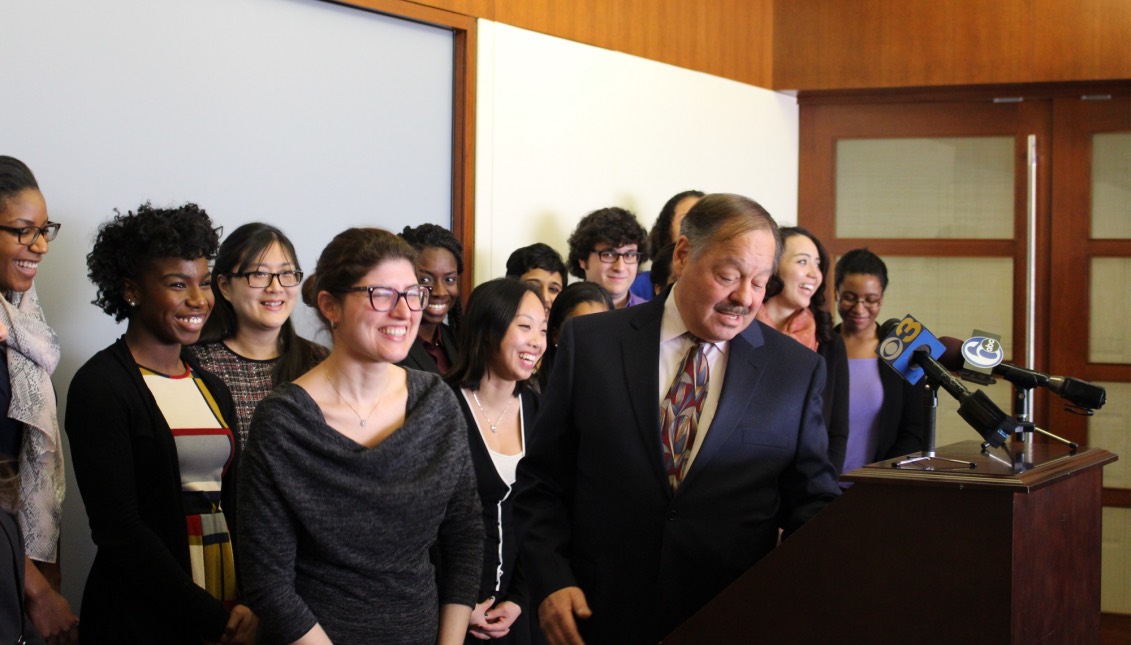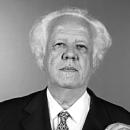
With one action, Nelson Díaz foregrounds Latinos in Philadelphia in a way that goes beyond mayoral aspirations
MÁS EN ESTA SECCIÓN
What the Anglo media doesn’t get about the significance of Nelson Díaz endowing a law chair in Latino Civil Rights at Temple could fill all of 5th Street from Lehigh to Allegheny.
Yesterday Nelson Díaz, one of Democratic candidates for mayor of Philadelphia, presented a check to Temple University Beasley School of Law to begin the process of endowing a law chair in Latino Civil Rights at the university. The total amount donated — $250,000 from Díaz, $450,000 from Exelon Corp. where until recently Díaz was a member of the board of directors — is about half of what is needed to endow a chair.
The Philadelphia Inquirer’s Chris Brennan wrote about the moment, noting on Twitter and online the “convenient timing” of Díaz’s press conference, just hours before another mayoral candidate, former council member Jim Kenney, officially announced his entry into the race.
File under convenient timing: Temple Univ. Law School working to name new chair for @NelsonDiaz2015 http://t.co/MmLY1U2U4H via @phillydotcom
— Chris Brennan (@ByChrisBrennan) February 4, 2015
In this, as in so much of the coverage of the doings and thoughts of Latinos in our city, the Anglo media just doesn’t get the significance, nor the symbolic resonance of this action.
In an AL DÍA News editorial of Nov. 29, 2012, we pointed out that “there are more than 100,000 Latino lawyers, judges, law professors, legal assistants, and law students in the United States, and according to one 2010 report that studied the upswing in minorities enrolled in law school, the number of Latino law students saw a leap of 874 percent in the past four decades.”
“So why this connection between law and Latinos?” we asked in then, and proceeded to explain. “In a 2011 article on a study of Latino lawyers in Washington state, María Chavez wrote: ‘Their civic involvement is largely intertwined with the complexity of their sense of Latino ethnic identity and history ... They understand that their professional status is what separates them from the lives of less-privileged Latinos, and because of this many are committed to using their newfound professional status to not only give back to the greater community but also improve prospects for social equity in the greater community.”
Of course, Díaz is smart to announce his purpose to endow a law chair at his alma mater (he was the first Puerto Rican to graduate from Temple Law) during his mayoral campaign, but he could have as easily convinced his fellow Exelon board members to contribute to a pro-Díaz PAC (Anthony H. Williams has one, according to WHYY Newsworks) instead of an endowed law chair, if his action were purely political.
But that’s the thing about the Latinos in Philadelphia. There’s this pesky desire to give back to, and improve the lives and opportunities of, not only our community but the community at large. A Latino Civil Rights Law chair will go a ways in addressing the erasure of Latino Civil Rights history, and heighten awareness of the momentous legal battles taking place to secure civil rights for the fastest growing demographic in our nation.
How many Anglos know that while Brown v. Board of Education is much better known, 1947‘s Mendez v. Westminster School District was the first case in which school segregation was successfully challenged in federal court? How many Anglos know that the struggle for civil rights fought by the (Puerto Rican) Young Lords on the East Coast and Midwest, and the (Chicano) Brown Berets on the West Coast, led many of those engaged to get law degrees and focus on civil rights law?
Within our own purview, how many know that some of the most important Latino civil rights battles have been — and are being — waged in Pennsylvania? In 2009, civil rights lawyer Juan Cartagena and LatinoJustice challenged Hazleton’s anti-immigrant ordinances, for instance. Hazleton keeps trying to impose their discriminatory municipal laws, and Latino civil rights lawyers keep beating it back in court.
Voter ID was challenged here legally as an abrogation of the civil rights of Latinos, African Americans, the elderly, the young and the disabled and others, and currently Cartagena and other Latino civil rights lawyers are, along with the organization Latino Lines, challenging the gerrymandering of Philadelphia and Pennsylvania districts that strip Latinos of their right to political representation.
As anyone who has been tokenized can tell you — and as any community that has been habitually ignored or suppressed can also attest — whether you are seated at the table when discussions of representation and issues of common good take place matters.
The Anglo media can play it off as simple political astuteness, but we know better. We know a first when we see it. We know the power of a first.
It matters that the university that is synonymous with Philadelphia will have the first Latino Civil Rights law chair in the commonwealth.
It matters greatly now, and it will matter even more years from now. No matter who ends up being mayor.






DEJE UN COMENTARIO:
¡Únete a la discusión! Deja un comentario.